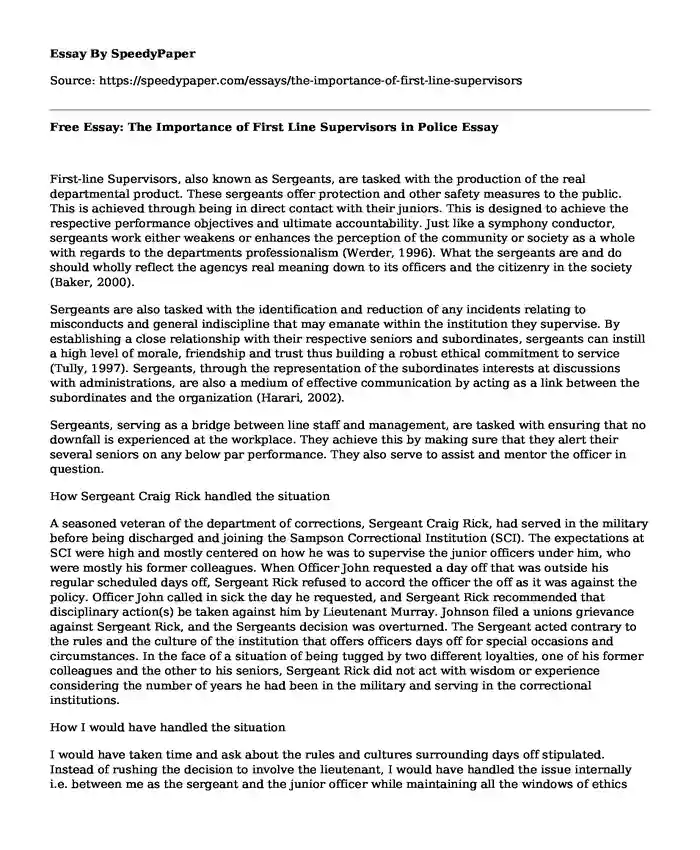
| Type of paper: | Essay |
| Categories: | Leadership analysis Police |
| Pages: | 3 |
| Wordcount: | 651 words |
First-line Supervisors, also known as Sergeants, are tasked with the production of the real departmental product. These sergeants offer protection and other safety measures to the public. This is achieved through being in direct contact with their juniors. This is designed to achieve the respective performance objectives and ultimate accountability. Just like a symphony conductor, sergeants work either weakens or enhances the perception of the community or society as a whole with regards to the departments professionalism (Werder, 1996). What the sergeants are and do should wholly reflect the agencys real meaning down to its officers and the citizenry in the society (Baker, 2000).
Sergeants are also tasked with the identification and reduction of any incidents relating to misconducts and general indiscipline that may emanate within the institution they supervise. By establishing a close relationship with their respective seniors and subordinates, sergeants can instill a high level of morale, friendship and trust thus building a robust ethical commitment to service (Tully, 1997). Sergeants, through the representation of the subordinates interests at discussions with administrations, are also a medium of effective communication by acting as a link between the subordinates and the organization (Harari, 2002).
Sergeants, serving as a bridge between line staff and management, are tasked with ensuring that no downfall is experienced at the workplace. They achieve this by making sure that they alert their several seniors on any below par performance. They also serve to assist and mentor the officer in question.
How Sergeant Craig Rick handled the situation
A seasoned veteran of the department of corrections, Sergeant Craig Rick, had served in the military before being discharged and joining the Sampson Correctional Institution (SCI). The expectations at SCI were high and mostly centered on how he was to supervise the junior officers under him, who were mostly his former colleagues. When Officer John requested a day off that was outside his regular scheduled days off, Sergeant Rick refused to accord the officer the off as it was against the policy. Officer John called in sick the day he requested, and Sergeant Rick recommended that disciplinary action(s) be taken against him by Lieutenant Murray. Johnson filed a unions grievance against Sergeant Rick, and the Sergeants decision was overturned. The Sergeant acted contrary to the rules and the culture of the institution that offers officers days off for special occasions and circumstances. In the face of a situation of being tugged by two different loyalties, one of his former colleagues and the other to his seniors, Sergeant Rick did not act with wisdom or experience considering the number of years he had been in the military and serving in the correctional institutions.
How I would have handled the situation
I would have taken time and ask about the rules and cultures surrounding days off stipulated. Instead of rushing the decision to involve the lieutenant, I would have handled the issue internally i.e. between me as the sergeant and the junior officer while maintaining all the windows of ethics and professionalism open. The leadership role of a supervisor is usually vital for the strength, stability, and future of any correctional institution. Since the supervisors form part of the management team, they should strive to ensure the criticality and responsibility of instilling important ethical values, enacting and maintenance of policies and procedures, and trying to achieve the strategic organizational goals and objectives (Tully, 2000).
References
Baker, T. & Fraustino, D. (2000). Effective police leadership. Flushing, NY: Looseleaf Law Publications.
Harari, O. (2002). The leadership secrets of Colin Powell. New York: McGraw-Hill.
Kaslow, F. (1977). Supervision, consultation, and staff training in the helping professions. San Francisco: Jossey-Bass Publishers.
Lindquist, C. & Whitehead, J. (1986). Burnout, job stress and job satisfaction among southern correctional officers: Perceptions and causal factors. J. Of Offender Rehabilitation, 10(4), 5-26. http://dx.doi.org/10.1080/10509674.1986.9963833
Tully, E. (2002). National Executive Institute Associates, Major cities chiefs association and Major County Sheriff's Association Leadership Bulletin. The Slippery Slope, 1-11.
Cite this page
Free Essay: The Importance of First Line Supervisors in Police. (2019, Sep 05). Retrieved from https://speedypaper.net/essays/the-importance-of-first-line-supervisors
Request Removal
If you are the original author of this essay and no longer wish to have it published on the SpeedyPaper website, please click below to request its removal:
- Free Essay Sample: Is Technology Taking Over
- Possessive Pronouns, Free Essay for English Learners
- First A. Author,
- Free Essay Sample on Software-Defined Storage
- Essay Example on Changing Families in the United States of America
- Exploring the Transformation of Futuristic Music: Essay Sample
- Free Essay on Role of the Police in Combating Organized Crime and Methods Used
Popular categories




